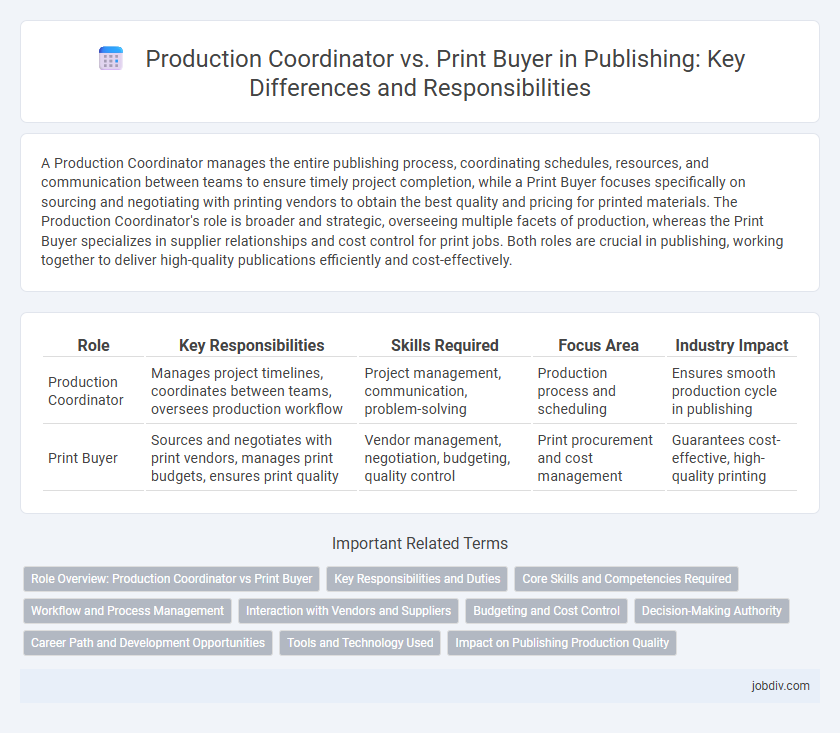A Production Coordinator manages the entire publishing process, coordinating schedules, resources, and communication between teams to ensure timely project completion, while a Print Buyer focuses specifically on sourcing and negotiating with printing vendors to obtain the best quality and pricing for printed materials. The Production Coordinator's role is broader and strategic, overseeing multiple facets of production, whereas the Print Buyer specializes in supplier relationships and cost control for print jobs. Both roles are crucial in publishing, working together to deliver high-quality publications efficiently and cost-effectively.
Table of Comparison
| Role | Key Responsibilities | Skills Required | Focus Area | Industry Impact |
|---|---|---|---|---|
| Production Coordinator | Manages project timelines, coordinates between teams, oversees production workflow | Project management, communication, problem-solving | Production process and scheduling | Ensures smooth production cycle in publishing |
| Print Buyer | Sources and negotiates with print vendors, manages print budgets, ensures print quality | Vendor management, negotiation, budgeting, quality control | Print procurement and cost management | Guarantees cost-effective, high-quality printing |
Role Overview: Production Coordinator vs Print Buyer
A Production Coordinator manages the scheduling, logistics, and communication between creative teams and vendors to ensure timely project completion in publishing. A Print Buyer specializes in sourcing and purchasing print services, negotiating costs, and maintaining relationships with printing suppliers to optimize budget and quality. Both roles are essential in streamlining the production process but focus on different aspects: coordination versus procurement.
Key Responsibilities and Duties
A Production Coordinator manages project timelines, liaises between creative teams and vendors, and oversees the workflow to ensure timely delivery of print materials. A Print Buyer specializes in sourcing printing services, negotiating vendor contracts, and securing cost-effective printing solutions without compromising quality. Both roles require strong communication skills and thorough knowledge of print production processes to coordinate successful publishing projects.
Core Skills and Competencies Required
Production Coordinators in publishing require strong project management abilities, proficiency in scheduling, and excellent communication skills to oversee the entire production process from manuscript to print. Print Buyers must have expertise in vendor negotiation, cost analysis, and knowledge of print technologies to secure quality materials at competitive prices. Both roles demand attention to detail, problem-solving capabilities, and a thorough understanding of the publishing workflow.
Workflow and Process Management
Production Coordinators oversee the entire publishing workflow by managing schedules, coordinating between design, editorial, and printing teams, ensuring deadlines are met efficiently. Print Buyers specialize in selecting vendors, negotiating contracts, and tracking print orders to optimize cost and quality within the production process. Both roles require strong process management skills, but Production Coordinators focus on end-to-end project flow while Print Buyers concentrate on procurement and vendor relationships.
Interaction with Vendors and Suppliers
Production Coordinators manage the workflow between publishing teams and vendors, ensuring deadlines and quality standards are met throughout the production process. Print Buyers specialize in negotiating contracts and securing cost-effective printing services, establishing strong supplier relationships to optimize budget and delivery. Both roles maintain continuous communication with vendors and suppliers to align production timelines, material specifications, and pricing terms.
Budgeting and Cost Control
Production Coordinators manage the overall production schedule and coordinate between departments to ensure projects stay within the allocated budget, focusing on timely resource allocation and workflow efficiency. Print Buyers specialize in negotiating print costs and securing competitive vendor pricing, directly impacting cost control through vendor selection and contract management. Both roles contribute to budgeting by balancing quality requirements with cost-effective solutions to maximize return on investment in publishing projects.
Decision-Making Authority
Production Coordinators manage project timelines and coordinate communication between vendors and internal teams, holding decision-making authority over scheduling and quality control decisions. Print Buyers possess specialized authority to select print vendors, negotiate contracts, and approve budgets related to printing services. Their distinct decision-making roles ensure seamless production workflows by balancing operational coordination with vendor procurement expertise.
Career Path and Development Opportunities
A Production Coordinator in publishing typically manages project timelines, coordinates between creative teams, and ensures smooth workflow, offering opportunities to advance into production management or operations roles. Print Buyers specialize in sourcing and negotiating with printing vendors, developing expertise in cost control and vendor relations that can lead to roles in procurement management or supply chain coordination. Both career paths provide growth potential, with Production Coordinators leaning toward project leadership and Print Buyers focusing on strategic vendor partnerships and budgeting.
Tools and Technology Used
Production Coordinators in publishing typically utilize project management software like Trello, Asana, and Microsoft Project to streamline workflows and maintain schedules, while Print Buyers rely heavily on procurement platforms and supplier databases such as PrintIQ and EFI Pace for vendor comparison and order tracking. Both roles leverage digital proofing tools like Adobe Acrobat and cloud storage solutions including Google Drive and Dropbox to facilitate communication and document sharing. Advanced color management systems and print estimation software are essential for Print Buyers to ensure cost-efficiency and quality control in print production.
Impact on Publishing Production Quality
A Production Coordinator ensures seamless communication and coordination across prepress, printing, and distribution phases, directly influencing publishing production quality by minimizing errors and delays. A Print Buyer specializes in sourcing and managing vendor relationships, negotiating costs and schedules to secure high-quality printing materials and services. Effective collaboration between these roles enhances overall production quality by combining logistical precision with cost-efficient, superior print outcomes.
Production Coordinator vs Print Buyer Infographic

 jobdiv.com
jobdiv.com